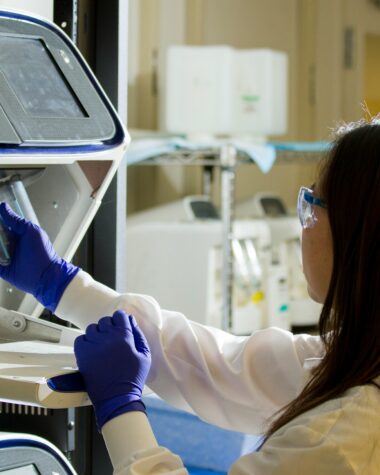Corbus Pharmaceuticals Holdings Inc. (NASDAQ:CRBP) is a U.S.-based clinical-stage biopharmaceutical company focused on developing transformative therapies that address serious illnesses with high unmet medical need. Founded in 2009 and headquartered in Norwood, Massachusetts, Corbus has evolved from its early roots in rare autoimmune diseases to become a cutting-edge innovator in oncology, immunology, and metabolic disorders. The company’s shift in strategy over the past several years reflects a disciplined effort to build a diversified and scalable pipeline leveraging next-generation drug platforms, first-in-class mechanisms, and proprietary licensing agreements with global research institutions and biotechnology leaders.
At its core, Corbus is committed to redefining how challenging diseases such as cancer, fibrosis, and obesity are treated—by targeting the underlying biology with precision-engineered therapies. Its portfolio currently includes three key assets: CRB-701, a next-generation antibody-drug conjugate (ADC) targeting Nectin-4 in solid tumors; CRB-601, a high-affinity anti-integrin monoclonal antibody designed to modulate the TGF-β pathway in immuno-oncology; and CRB-913, a cannabinoid receptor inverse agonist intended for the treatment of obesity. These programs represent a deliberate pivot toward multi-billion-dollar therapeutic areas, with an emphasis on oncology indications that demand both innovation and tolerability.
Corbus’ ability to access these programs has been strategically enhanced through exclusive licensing partnerships. In particular, the company has secured regional rights to CRB-701 from CSPC Megalith Biopharmaceutical Co. Ltd. in China and obtained rights to CRB-601 from the Regents of the University of California. These collaborations not only grant Corbus access to promising investigational compounds but also reduce early development risk and provide opportunities for global commercial expansion upon successful clinical validation.
Financially, Corbus is in a better position than many of its micro-cap biotech peers. With $149.1 million in cash and equivalents as of year-end 2024 and a lean operating structure, the company has runway into mid-2027, giving it the time and resources necessary to complete multiple Phase 1 trials and advance its portfolio without near-term dilution pressures. Backed by strong institutional coverage, increasing analyst support, and renewed investor interest, Corbus is building momentum at a time when much of the biotech sector remains undervalued.
While the company’s programs remain in the early stages of clinical development, Corbus is already attracting attention for its disciplined execution, scientific rigor, and willingness to take a differentiated path in one of the most competitive segments of healthcare innovation. For investors seeking exposure to the next wave of oncology and immunology breakthroughs, Corbus Pharmaceuticals represents a speculative yet compelling bet on the future of personalized medicine.
Market Mispricing Has Disconnected from Pipeline Potential
Corbus’ decline in market capitalization in recent months has little to do with its own clinical data. Rather, the drop appears driven by sentiment spillover from negative results posted by unrelated companies like Novo Nordisk in obesity studies. This knee-jerk reaction has, according to Galzus Research, effectively priced Corbus’ pipeline at zero — a gross misjudgment when viewed through the lens of its active drug candidates and trial timelines.
Despite no material changes to its own clinical trials or safety profile, CRBP’s stock was dragged down over 20% in a matter of weeks — a move many contrarian analysts now see as severely overdone.
Flagship Program CRB-701: Unlocking Next-Gen ADC Oncology Therapies
The centerpiece of Corbus’ pipeline is CRB-701, a next-generation antibody-drug conjugate (ADC) targeting Nectin-4, a clinically validated tumor antigen. Unlike earlier Nectin-4 drugs that showed high toxicity or limited durability, CRB-701 uses a refined linker-payload design and appears to demonstrate better selectivity, tolerability, and therapeutic impact.
The company obtained U.S. and U.K. rights to CRB-701 via a licensing deal with CSPC Megalith Biopharmaceutical Co., and early-phase Chinese data have already confirmed antitumor activity in patients with bladder and breast cancers. The U.S.-based Phase 1 study is actively enrolling and expected to deliver results by Q4 2025 — a major upcoming catalyst that could dramatically rerate the stock.

CHECK THIS OUT: Johnson & Johnson (JNJ) can be the Next Trillion-Dollar Stock and Boston Scientific (BSX) Just Signed a $45M Deal—Here’s What It Means for Investors.
CRB-601 Targets the Tumor Microenvironment: A Potential Breakthrough in Immune Modulation
Corbus’ second lead asset is CRB-601, a high-affinity monoclonal antibody targeting αvβ8 integrin, a key player in the immunosuppressive tumor microenvironment. By modulating the TGF-β signaling pathway, CRB-601 could potentiate other therapies, including checkpoint inhibitors, and help reprogram “cold” tumors into immunogenic ones.
Currently in a U.S. Phase 1 trial, this candidate is a first-in-class approach to addressing solid tumor resistance and has attracted early attention from researchers in immuno-oncology. Corbus has exclusive rights to this program through a license agreement with the University of California.
CRB-913: A Preclinical Bet on the Booming Obesity Market
While still preclinical, CRB-913 is Corbus’ bold entry into the highly lucrative obesity drug space. It functions as an inverse agonist of cannabinoid receptors (CB1), aiming to regulate appetite and metabolism without the central nervous side effects of older agents.
As the global obesity therapeutics market is projected to grow past $100 billion by 2030, Corbus’ early presence in this space offers strategic upside if even modest clinical success is achieved. With competitors like Novo Nordisk and Eli Lilly dominating headlines, a differentiated mechanism of action may carve out a niche for Corbus in the coming years.
Strong Financials Provide Stability Amid Clinical Execution
Unlike many micro-cap biotech peers, Corbus is not fighting for survival. As of the end of 2024, the company reported $149.1 million in cash and cash equivalents, thanks in part to raising $180 million through open market offerings and a public sale. With a lean operational structure and an annual burn rate that totaled $32.2 million in R&D and $16.5 million in G&A expenses, the company’s cash runway extends into mid-2027.
This financial cushion allows Corbus to complete key Phase 1 trials without near-term dilution risk, giving management the flexibility to focus on clinical success rather than fundraising.
Analyst Upgrades and Price Targets Signal Long-Term Upside
Multiple Wall Street firms continue to support CRBP despite recent volatility. Mizuho has maintained an “Outperform” rating with a $32 target, while Wedbush holds a $51 price target. B. Riley also initiated coverage in 2024 with a bullish outlook. These targets reflect analyst confidence in the long-term potential of Corbus’ pipeline.
Investor sentiment may be sour in the short term, but these professional assessments point to a vastly different valuation story over a 12–24 month horizon — especially if CRB-701 data validates early safety and efficacy signals.
Technical Indicators Suggest Reversal Is Imminent
Technical analysis supports the idea that CRBP may be bottoming out. The stock’s Relative Strength Index (RSI) recently dropped below 30, a strong oversold indicator, suggesting sellers may be exhausted. Meanwhile, trading volume spiked significantly in early June 2025 during a 13% rally, indicating renewed buying interest.
If bullish sentiment continues to return, the current level could serve as a base for a sustained upward move — particularly if tied to trial updates or partnership announcements.
Risk Factors: Binary Outcomes and Competition Remain Real
No bullish thesis is complete without addressing the risks. Corbus’ drug candidates are all in early stages of development, and clinical failures could reset the valuation again. Additionally, the biotech landscape is fiercely competitive — especially in ADCs and obesity. The company also faces regulatory and commercialization challenges common to small-cap pharma.
That said, with a multi-year cash runway, non-dilutive financing already secured, and multiple shots on goal, Corbus is arguably better positioned than many of its micro-cap peers to navigate these challenges.
Conclusion: A Speculative Buy with Multi-Bagger Potential
Corbus Pharmaceuticals may not yet have commercial-stage assets, but its pipeline offers the kind of upside optionality that investors dream of. The company is now trading at a valuation that assumes near-zero probability of success — an assumption that many biotech specialists are beginning to challenge. With data from two Phase 1 trials expected in the next 12–18 months, CRBP has multiple chances to surprise the market and ignite a revaluation cycle.
This is a speculative stock — but for investors willing to endure short-term pain for potential long-term gain, Corbus may be one of the most compelling small-cap biotech plays of 2025.
READ ALSO: This Tiny Surgical Robot Stock Could Disrupt a $30 Billion Industry: Microbot Medical (MBOT) and Pro-Dex (PDEX) Plunges 39% – Here’s Why Smart Investors Are Buying the Dip.








